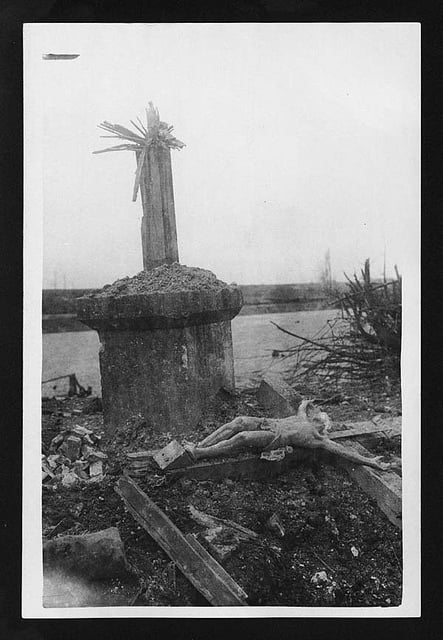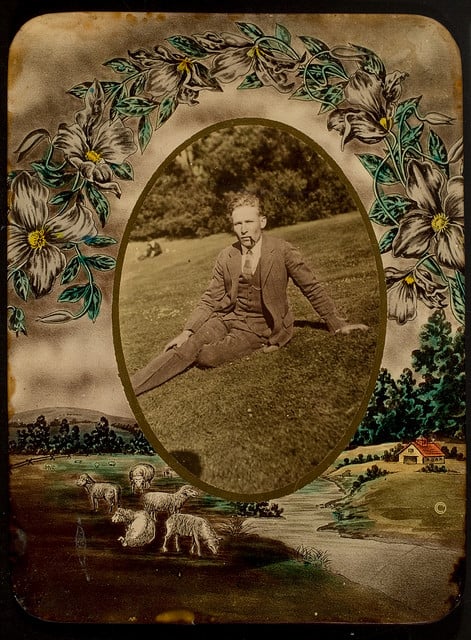Theodore Savage (1)
By:
March 11, 2013

HILOBROW is pleased to present the first installment of our serialization of Cicely Hamilton’s Theodore Savage (also known as Lest Ye Die). New installments will appear each Monday for 25 weeks.
When war breaks out in Europe — war which aims successfully to displace entire populations — British civilization collapses utterly and overnight. The ironically named Theodore Savage, an educated and dissatisfied idler, must learn to survive by his wits in the new England, where 20th-century science, technology, and culture are regarded with superstitious awe and terror.
The book — by a writer best known today for her suffragist plays, treatises, and activism — was published in 1922. In September 2013, HiLoBooks will publish it in a gorgeous paperback edition, with an Introduction by Gary Panter.
SUBSCRIBE to HILOBROW’s serialized fiction via RSS.
ALL EXCERPTS: 1 | 2 | 3 | 4 | 5 | 6 | 7 | 8 | 9 | 10 | 11 | 12 | 13 | 14 | 15 | 16 | 17 | 18 | 19 | 20 | 21 | 22 | 23 | 24 | 25
If it had been possible for Theodore Savage to place on record for those who came after him the story of his life and experiences, he would have been the first to admit that the interest of the record lay in circumstance and not in himself. From beginning to end he was much what surroundings made of him; in his youth the product of a public school, Wadham and the Civil Service; in maturity and age a toiler with his hands in the company of men who lived brutishly. In his twenties, no doubt, he was frequently bored by his clerking duties and the routine of the Distribution Office; later on there were seasons when all that was best in him cried out against confinement in a life that had no aspiration; but neither boredom nor resentment ever drove him to revolt or set him to the moulding of circumstance. If he was destined to live as a local tradition and superman of legend, the honour was not gained by his talents or personal achievements; he had to thank for it an excellent constitution, bequeathed him by his parents, certain traces of refinement in manner and speech and the fears of very ignorant men.
When the Distribution Office — like his Hepplewhite furniture, his colour-prints and his English glass — was with yesterday’s seven thousand years, it is more than possible that Theodore Savage, looking back on his youth, saw existence, till he neared the age of thirty, as a stream of scarcely ruffled content. Sitting crouched to the fire in the sweat-laden air of his cabin or humped idly on a hillside in the dusk of summer evening, it may well have seemed, when his thoughts strayed backwards, that the young man who once was impossibly himself was a being whom care did not touch. What he saw with the eye of his mind and memory was a neat young Mr. Savage who was valeted in comfortable chambers and who worked, without urgence, for limited hours, in a room that looked on Whitehall. Who in his plentiful leisure gained a minor reputation on the golf-links! Who frequented studios, bought — now and then — a picture and collected English glass and bits of furniture. Who was passably good-looking, in an ordinary way, had a thoughtful taste in socks and ties and was careful of his hands as a woman…. So — through the vista of years and the veil of contrast —Theodore may have seen his young manhood; and in time, perhaps, it was difficult for a coarse-fingered labourer, dependent for his bread on the moods of nature, to sympathize greatly with the troubles of neat Mr. Savage or think of him as subject to the major afflictions of humanity.
All the same, he would spend long hours in communion with his vanished self; striving at times to trace resemblances between the bearded, roughened features that a fishing-pool reflected and the smooth-chinned civil servant with brushed hair and white collar whom he followed in thought through his work, his amusements, his love-making and the trivial details of existence…. And imagining, sometimes, the years and the happenings that might have been if his age, like his youth, had been soaped and collared, routined by his breeding and his office; if gods and men had not run amuck in frenzy and his sons had been born of a woman who lived delicately — playing Chopin of an evening to young Mr. Savage and giving him cream in his tea?….
Even if life in his Civil Service days was not all that it shone through the years of contrast, Theodore Savage could have had very little of hardship to complain of in the days when he added to a certain amount of private income a salary earned by the duties of the unexacting billet which a family interest had secured for him. If he had no particular vocation for the bureaucratic life — if good painting delighted, and official documents bored him — he had sufficient common sense to understand that it is given to most of us, with sufficient application, to master the intricacies of official documents, while only to few is it given to master an art. After a phase of abortive experiment in his college days he had realized — fortunately — that his swift and instinctive pleasure in beauty had in it no creative element; where-upon he settled down, early and easily, into the life and habits of the amateur…. There remained with him to the end of his days an impression of a young man living pleasurably, somewhat fastidiously; pursuing his hobbies, indulging his tastes, on the whole without much damage to himself or to others affected; acting decently according to his code and, when he fell in love and out of it, falling not too grossly or disastrously. If he had a grievance against his work at the Distribution Office, it was no more serious than this: it took much time, certain hours every day, from the interests that counted in his life. And against that grievance, no doubt, he set the ameliorating fact that his private means unaided would hardly have supported his way of existence, his many pleasant interests and himself; it was his civil servant’s salary that had furnished his rooms in accordance with his taste and made possible the purchase of his treasured Fragonard and his bell-toned Georgian wine-glasses…. The bearded toiler, through a mist of years, watched a young man dawdling, without fear of the future, through a world of daily comforts that to his sons would seem fantastic, the creation of legend or of dream.
It was that blind and happy lack of all fear of the future that lent interest to the toiler’s watching; knowing what he knew of the years that lay ahead, there was something of grim and dramatic humour in the sight of himself — yea, Theodore Savage, the broken-nailed, unshorn — arrayed of a morning in a flowered silk dressing-gown or shirt-fronted for an evening at the opera…. As it was in the beginning, is now and ever shall be — that, so it seemed to him in later years, had been the real, if unspoken, motto of the world wherein he had his being in the days of his unruffled content….
Of the last few weeks in the world that was and ever should be he recalled, on the whole, very little of great hurrying and public events; it was the personal, intimate scenes that stood out and remained to a line and a detail. His first meeting with Phillida Rathbone, for instance, and the chance interview with her father that led to it: he could see himself standing by Rathbone’s desk in the Distribution Office, see the bowl between his fingers, held to the light — see its very shape and conventional pattern of raised flowers.
Rathbone —John Rathbone — was his chief in his Distribution days; a square-jawed, formidable, permanent official who was held in awe by underlings and Ministers, and himself was subject, most contentedly subject, to a daughter, the ruler of his household. Her taste in art and decoration was not her father’s, but, for all the bewilderment it caused him, he strove to gratify it loyally; and for Phillida’s twenty-third birthday he had chosen expensively, on his way to the office, at the shop of a dealer in antiquities. Swept on the spate of the dealer’s eloquence he had been pleased for the moment with his find — a flowered bowl, reputed Chelsea; it was not until half an hour later that he remembered uneasily his daughter’s firm warnings against unaided traffic with the miscreants who deal in curios. With the memory uncomfortable doubts assailed him, while previous experiments came thronging unpleasantly to mind — the fiasco of the so-called Bartolozzi print and the equally lamentable business of the so-called Chippendale settee…. He drew his purchase from its paper wrapping, set it down on the table and stared at it. The process brought no enlightenment and he was still wrestling with uncomfortable doubts when Theodore Savage knocked and came in with a draft report for approval.
The worry born of ignorance faded out of Rathbone’s face as he conned the document and amended its clauses with swift pencilled notes in the margin; he was back with the solidities he knew and could make sense of, and superfluous gimcracks for the moment had ceased to exist. It was Savage who unwittingly recalled their existence and importance; when his chief, at the end of his corrections, looked up, the younger man was eyeing the troublesome gimcrack with a meditative interest that reminded Rathbone of his daughter’s manner when she contemplated similar rubbish.
“Know anything about old china?” he inquired — an outward and somewhat excessive indifference concealing an inward anxiety.
“Not much,” said Theodore modestly; but, taking the query as request for an opinion, his hand went out to the bowl.
“What do you make of it?” asked Rathbone, still blatantly indifferent. “I picked it up this morning — for my daughter. Supposed to be Chelsea — should you say it was?”
If the answer had been in the negative the private acquaintance between chief and subordinate would probably have made no further progress; no man, even when he makes use of it, is grateful for the superior knowledge in a junior that convicts him to his face of gullibility. As it was, the verdict was favourable and Rathbone, in the relief of finding that he had not blundered, grew suddenly friendly — to the point of a dinner invitation; which was given, in part, as instinctive thanks for restored self-esteem, in part because it might interest Phillida to meet a young man who took gimcracks as gravely as herself. The invitation, as a matter of course, was accepted; and three days later Savage met Phillida Rathbone.
“I’ve asked a young fellow you’re sure to get on with”— so Rathbone had informed his daughter; who, thereupon, as later she confessed to Theodore, had made up her mind to be bored. She threw away her prejudice swiftly when she found the new acquaintance talked music with intelligence — she herself had music in her brain as well as in her finger-tips — while he from the beginning was attracted by a daintiness of manner and movement that puzzled him in Rathbone’s daughter…. From that first night he must have been drawn to her, since the evening remained to him clear in every detail; always in the hollow of a glowing fire he could summon up Phillida, himself and Rathbone, sitting, the three of them, round the table with its silver and tall roses…. In the centre a branching cluster of roses — all yellow, like Phillida’s dress…. Rathbone, for the most part, good-naturedly silent, Phillida and himself talking swiftly…. In shaded light and a solid, pleasant comfort; ordinary comfort, which he took for granted as an element of daily life, but which yet was the heritage of many generations, the product of long centuries of striving and cunning invention…. Later, in the drawing-room, the girl made music — and he saw himself listening from his corner of the sofa with a cigarette, unlit, between his fingers. Above all it was her quality of daintiness that pleased him; she was a porcelain girl, with something of the grace that he associated with the eighteenth century….
After half an hour that was sheer content to Theodore she broke off from her playing to sit on the arm of her father’s chair and ruffle his grey hair caressingly.
“Old man, does my noise on the piano prevent you from reading your paper?”
Whereat Rathbone laughed and returned the caress; and Phillida explained, for the visitor’s benefit, that the poor dear didn’t know one tune from another and must have been bored beyond measure — by piano noises since they came upstairs and nothing but music-talk at dinner.
“I believe we’ve driven him to the Montagu divorce case,” she announced, looking over his shoulder.” “‘Housemaid cross-examined — the Colonel’s visits.’ Daddy, have you fallen to that?”
“No, minx,” he rebuked her, “I haven’t. I’m not troubling to wade through the housemaid’s evidence for the very good reason that it’s quite unnecessary. I shall hear all about it from you.”
“That’s a nasty one,” Phillida commented, rubbing her cheek against her father’s. She turned the paper idly, reading out the headlines. “‘American elections —Surprises at Newmarket —Bank Rate’—There doesn’t seem much news except the housemaid and the colonel, does there?”
Rathbone laughed as he pinched her cheek and pointed — to a headline here and a headline there, to a cloud that was not yet the size of a man’s hand, “It depends on what you call news. It seems to have escaped you that we’ve just had a Budget. That matters to those of us who keep expensive daughters. And, little as the subject may interest you, I gather from the size of his type, that the editor attaches some importance to the fact that the Court of Arbitration has decided against the Karthanian claim. That, of course, compared to a housemaid in the witness-box is”—
“Ponderous,” she finished and laughed across at Theodore. “Important, no doubt, but ponderous — the Court of Arbitration always is. That’s why I skipped it.” … Then, carelessly interested, and running her eye down the columns of the newspaper, she supposed the decision was final and those noisy little Karthanians would have to be quiet at last. Rathbone shrugged his shoulders and hoped so.
“But they’ll have to, won’t they?” said Phillida. “Give me a match, Daddy — There’s no higher authority than the Court of Arbitration, is there?”
“If,” Rathbone suggested as he held a light to her cigarette, “if your newspaper reading were not limited to scandals and chiffons, you might have noticed that your noisy little friends in the East have declared with their customary vehemence that in no circumstances whatever will they accept an adverse verdict — not even from the Court of Arbitration.”
“But they’ll have to, won’t they?” Phillida repeated placidly. “I mean — they can’t go against everybody else. Against the League.”
RADIUM AGE SCIENCE FICTION: “Radium Age” is HILOBROW’s name for the 1904–33 era, which saw the discovery of radioactivity, the revelation that matter itself is constantly in movement — a fitting metaphor for the first decades of the 20th century, during which old scientific, religious, political, and social certainties were shattered. This era also saw the publication of genre-shattering writing by Edgar Rice Burroughs, Sax Rohmer, E.E. “Doc” Smith, Jack London, Arthur Conan Doyle, Aldous Huxley, Olaf Stapledon, Karel Čapek, H.P. Lovecraft, Charlotte Perkins Gilman, Yevgeny Zamyatin, Philip Gordon Wylie, and other pioneers of post-Verne/Wells, pre-Golden Age “science fiction.” More info here.
HILOBOOKS: The mission of HiLoBooks is to serialize novels on HiLobrow; and also, as of 2012, operating as an imprint of Richard Nash’s Cursor, to reissue Radium Age science fiction in beautiful new print editions. So far, we have published Jack London’s The Scarlet Plague, Rudyard Kipling’s With the Night Mail (and “As Easy as A.B.C.”), Arthur Conan Doyle’s The Poison Belt, H. Rider Haggard’s When the World Shook, Edward Shanks’s The People of the Ruins, William Hope Hodgson’s The Night Land, and J.D. Beresford’s Goslings. Forthcoming: E.V. Odle’s The Clockwork Man, Cicely Hamilton’s Theodore Savage, and Muriel Jaeger’s The Man with Six Senses. For more information, visit the HiLoBooks homepage.
SERIALIZED BY HILOBOOKS: Richard Connell’s “The Most Dangerous Game” | Jack London’s The Scarlet Plague | Rudyard Kipling’s With the Night Mail (and “As Easy as A.B.C.”) | Arthur Conan Doyle’s The Poison Belt | H. Rider Haggard’s When the World Shook | serialized between March and August 2012; Edward Shanks’ The People of the Ruins, serialized between May and September 2012; William Hope Hodgson’s The Night Land, serialized between June and December 2012; J.D. Beresford’s Goslings, serialized between September 2012 and May 2013; and Cicely Hamilton’s Theodore Savage, serialized between March and August 2013.


